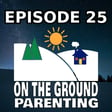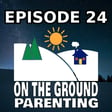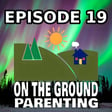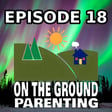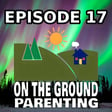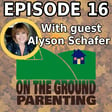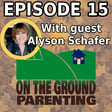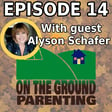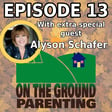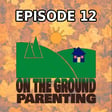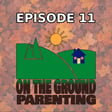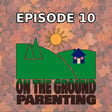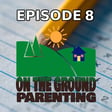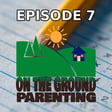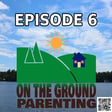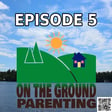Introduction and Sponsor Acknowledgment
00:00:00
Speaker
Today's episode of On the Ground Parenting is made possible by the generous donations of our listeners. To learn more, look in the show notes or listen to the end of the episode.
Host Introductions and Absence of Kelly
00:00:34
Speaker
Welcome back everyone to On the Ground Parenting, brought to you by the Parenting Education Team from Muskoka Family Focus. My name is Sandy and I'm joined by my colleagues, Sam and Justin.
00:00:47
Speaker
Welcome to all of you and I'm pleased that we're here. ah Kelly, who is ah typically been involved, she's fiddling in Ireland somewhere and another member of our parenting education team, Justin, is joining us. So we're happy to have you here and looking forward to your um your reflections and your input as a dad, Justin.
00:01:08
Speaker
Yeah, excited to be here. It's been a long time coming, so thrilled to be making my first appearance. That's great.
September Transitions: Emotions and School Start
00:01:15
Speaker
Well, we've been talking about September and what it's like, maybe the beginnings, starting school, starting daycare, starting college, university, jobs perhaps, and also the emotions that are arising from those experiences and how we can be more present for ourselves and for our children.
00:01:33
Speaker
And then there's that other thing that crops up that all of a sudden you notice dishes aren't being done, maybe floors aren't being vacuumed, um Maybe the garbage isn't being taken out and you're thinking, who is not doing their job?
00:01:47
Speaker
Well, probably each and every one of you in your family, because in my experience, what I've noticed is that when we transition from one season to the next, we lose our rhythm, we lose the momentum.
00:01:58
Speaker
And especially when we're coming off of summer, it's almost like no one knows what to do. So we want to talk about chores and the importance of chores and who should be doing chores.
Chores and Skill Development for Children
00:02:10
Speaker
What age should children be participating in doing chores and how can you help them gain skill? So in your household, Justin, what does the whole topic of chores look like?
00:02:22
Speaker
Well, our house is ah it's a busy household. We live rurally, as you all know. And so there's grounds to take care of in and out of the house. There are dogs, there are cats, there are geckos, there are chickens.
00:02:36
Speaker
And with that comes a lot of extra work on top of the regular household, you know, laundry and vacuuming and and cleaning up the dishes. So it's a battle, like you said, especially when there is something that throws you off that regular routine.
00:02:50
Speaker
And sometimes routines are weekly and sometimes they're the routine of the year, right? And so by the springtime, you're humming on like a pretty good machine as a group in your household. And then that summer is sort of I wouldn't say a roadblock, but it changes the routine, that's for sure.
00:03:06
Speaker
And it takes a little bit of time to wake up on the right side of the bed with that hop in your step and for you to get used to a lot of different factors. And like you said, Sandy, in some of that transition time, you start looking around and things are looking a little bit more scruffy and jobs aren't getting done. That's for sure.
00:03:24
Speaker
Yes, scruffy. That's a good way of putting it. Yeah. And and Sam, but what's happening in your house for chores? It's an interesting little dynamic here because we do have my son and his girlfriend are adults.
00:03:38
Speaker
um And then there's my husband and I who are adults. And then there's my 14-year-old who is transitioning back into being at school, which is always a bit tricky. He has some wackadoodle sleep schedule stuff going on. we're mornings have been tricky for him. And I just, I realized this week how stinking tired I am.
00:03:56
Speaker
And it's because of the September transition. There's been so much to try to remember, more things back in the routine that were gone for the summertime. That's one thing as a ah parent of older children that you haven't maybe experienced when you have younger children that in the summertime, you're not as responsible for what they're doing if they're getting out the door, because they're probably not getting out the door now I'm back to the before school prompts of, do you have your water bottle ready? Are you taking a snack with you?
00:04:24
Speaker
It's time to get up. Oh, yeah, I overslept this week. And um it's 820. And you're awake. So why were you not? Why didn't you get up and start doing your morning stuff?
00:04:36
Speaker
um So this was these are just all things that have been kind of going through my mind this week. Anyways, it's been an interesting, exhausting couple of weeks. And I realized today why I'm so stinking tired.
00:04:49
Speaker
And next week he goes to school in the afternoon. So it's a different sort of situation of remembering to do the afternoon things for him. So it's a lot of...
00:05:00
Speaker
prompting and getting organized but yeah the dishes have been a battle this week the floor is really dirty right now as I'm looking at it I'm thinking does nobody wash this floor I'm like I'm the nobody who usually washes the floor that's my chore and I have not done it so anyways yeah it's been it's a tricky one for sure yeah I think that even though um you know, different family members will have responsibility for chores. It still keeps coming back to the parents or the adults, whoever the caregivers may be for the children in that household to, to be the coordinating factor, to be the person who is um is somehow, mean yeah, making sure that there's a schedule and sticking with it and, and,
00:05:47
Speaker
Yeah. And then follow through. Now, what happens in your house, Justin? So your children are the youngest out of um those of us who are involved in the yeah um podcast this evening, the session right now.
00:06:02
Speaker
And um what's it been like for you as far as ah sharing chores for your children to take the responsibility? What kinds of chores will your will your children be doing around your home?
00:06:17
Speaker
um This is something I was thinking about heading into recording this podcast and joining ah the podcast. And that is that I think many of the reflections or anecdotes that I'll have to offer ah from the perspective of that experimentation mode.
00:06:36
Speaker
rather than looking back on what has worked and what hasn't worked. We're right like you said, ah due to the ages of my children, which are, um I have two daughters. One is six and one is actually turning 10 next week.
00:06:49
Speaker
um Yeah. So because of those ages and stages, we're sort of just trying things out. um And so it's been a challenge. are our gals are pretty cooperative people, generally speaking, in terms of their nature.
00:07:07
Speaker
But, you know, cleaning, whether regardless of your temperament is something that, you know, your mileage varies on on how willing you are to do it, even though you know you must or how cooperative of a person you might be.
00:07:21
Speaker
So it's been it's been difficult. I think right now, if I could talk about some of their main chores. Oh, yeah. They help. Right. ah One of the things that we try to do at our house is have them involved in what we're doing.
00:07:35
Speaker
So if my partner is doing some gardening or stacking wood, she'll ask Teal and Echo to join. And if I'm cooking, maybe not cleaning the cooking, but cooking, baking, those sorts of things, we we get them to jump right in there and and they enjoy those things.
00:07:54
Speaker
Certainly getting the room cleaned up, right, stuffies, dresses all over the floor, that stuff ah is a little bit more difficult to compel them to do independently. And so that's an ongoing battle, right?
00:08:06
Speaker
I actually think that's one of the things that we spend most of our time disagreeing or or arguing or struggling with. is moving them in the direction of cleaning up after
Teaching Importance of Chores
00:08:17
Speaker
So that might be the the final boss chore. But something that we try to instill in not just the what we're getting them to do or how we're getting them to do it, but why we're trying to get them to do it, we try to help them understand that this is a household that they belong to.
00:08:34
Speaker
that this is their home. This is where they will live for you know perhaps many years. And maybe one day it'll be there their place, right? And so we try to convince them to operate under the pretense that anything that they're investing in is part of their involvement in this team, in this home, in this you know shared set of goals.
00:08:59
Speaker
And so those chores are are a big part of that. And I often have that conversation here about care tasks that need to be done in the home. Laundry is a cycle, but it's a never-ending cycle. We all have our part to play in making sure that the laundry cycle keeps moving forward.
00:09:14
Speaker
Yeah. My husband is so good at doing the laundry. His area of need is knowing what belongs to who. So that's usually I help him sort through things at the end. It just is that constant reminder of, okay, so we're making dinner. Can you two other adults please do the dishes in preparation for that to happen? Yeah.
00:09:33
Speaker
I'd love to say the dishes get done every night after dinner here, but the dishwasher's already running because there are five people living in this house. So then the dishes need to get finished during the day in preparation for the next dinner prep that has to happen.
00:09:45
Speaker
And that's just the cycle that works here. Some people would be totally appalled by that, but it is really the only thing that can keep things moving along here because it is just a constant stream of dirty dishes and dirty laundry. But... um We do talk a lot about the care tasks and how we're all responsible for making sure that our home is somewhere where we want to be and it's safe and happy and healthy and all of those things. so Yeah, you've both touched on the essence of the importance of the why and just the fact that every human being has this need to
00:10:15
Speaker
learn how to take care of themselves so that they can live in a clean, habitable space and so that they're not wasting of things, you know, either food items or just their own time, perhaps. And instilling that in another human being is sort of tricky, I think. You know, Justin, you talked about bringing our children in to do chores alongside of us. And I think When children are young, they really want to help out because they want to be with their parents. They want to do everything that their parents are doing.
00:10:50
Speaker
So that's almost like an easy ease into it, except that the finesse and the skill that they have to do the chore is not always the best. So for example, if you're sweeping the floor and they're sweeping that pile of, you know, dirt dust that you had, that you were just about getting ready to put it on the dustpan and they want to help do it and flex. There it goes all all around again.
00:11:14
Speaker
So um just knowing that when they want to help out at age two, we really need to take the time to include them because that's the time when the mindset of this is what I'm doing because this is what I'm doing to belong, to take care of my space.
00:11:32
Speaker
So that we can, you know, Sam, you've given it that the care tasks, so I can care for myself and I can care for others. And Justin, you even brought in the added element and Sam, you didn't mention, but I happen to know you've got an abundance of beautiful pets in your home.
00:11:47
Speaker
And but what I remember with my kids too was that helping them understand that without our involvement, then that pet would not live. Because our involvement meant it would mean maybe cleaning their space, if it's a cat litter or so scooping the dog poop or...
00:12:02
Speaker
You know, you've got chickens, you still have to clean up the bedding and and also feeding them and how the relationship with the animal will be that much more enhanced and precious because of the animal seeing, oh, you're my person and you just gave me food and I love food.
00:12:19
Speaker
So you can just see that building them as well. And then, yeah we get into the older age, like Sam, you mentioned, and I think it's finding that system that works for you. and So let's just dive a little bit into your own life as a child.
00:12:35
Speaker
You know, our parenting programs, ah Bounce Back and Thrive, and some of the other programs have this opportunity for us as parents to reflect on what was it like for us as a child or what was my experience?
00:12:47
Speaker
So did you do chores when you were a kid growing up? what What kind of chores did you do?
Chores and Childhood Reflections
00:12:53
Speaker
So we definitely had a lot of chores and we had, it grew as we got older. So we would start out with just trying to keep our rooms clean.
00:13:00
Speaker
And I'm sure that I'm not the only Gen X type age person who can remember their mom storming into their bedroom with a garbage bag because you didn't do a good enough job cleaning up your room. um Oh, my son is also just nodding when he heard me say that. i ah Perhaps I also did that when he was younger. I don't remember. Yeah.
00:13:21
Speaker
But yeah, so those would be kind of the basic things. But then as we got older and my parents wouldn't be home, so then making dinner would be part of our responsibilities or doing the dishes or both. um So there definitely was a lot of things that we did and it just became part of the normal routine. But I think it was because we learned how to do it along with my parents as we were getting older. So we definitely had that that training early to know how to do the things.
00:13:47
Speaker
and Justin, what was it like for you? Yeah, I think this touches on on an interesting topic or or a nice little angle for chores and children and that dichotomy. I had a chaotic upbringing, right? My parents divorced young and a lot of bouncing around, a lot of moving around. And as as we know, accountability becomes a little bit more difficult to sustain and manage for parents in that situation.
00:14:10
Speaker
And ours was certainly like that. So it has me thinking about how whatever stability that we can find and bring into our jobs as stewards of these young lives, it's going to set us up in so many different ways.
00:14:24
Speaker
We had no accountability as little people. And so there were no chores. And It brings another topic up. My relationship with my dad was such that there was always this struggle of where is the discipline? Where is the accountability?
00:14:39
Speaker
Where is the urgency to want to be a contributor in the same way that me, as your father, I'm i'm doing for you? Where's the reciprocity? Where's the the growing sense of responsibility in this young person?
00:14:52
Speaker
And I think that without the investment or the perceived investment on my part from my parents, or in this case, my dad, it's really difficult for a young person to fathom.
00:15:04
Speaker
I'm going to give up my my time and my interests into contributing to this ecosystem when it doesn't feel like people are pouring into me. Right. And for whatever reason that is, and in my case,
00:15:17
Speaker
um You know, difficulties with divorce and geography and, you know, sustained routines. Those all sort of led to that discombobulated, you know, relationships that we all had, um not only with each other, but our place, right? Our home.
00:15:33
Speaker
our sense of belonging to a place and, you know, the subsequent sense of responsibility to that place. Right. I look at my, my young kids and all the people in our extended world, right. Cousins, uncles, aunts, grandparents.
00:15:48
Speaker
And I think about which ones and how much, time they invest in our lives, in our children, not with malice or judgment in my sort of evaluation of that, but noticing, simply noticing and more so noticing in regards to how that's affected their relationships with my kids.
00:16:10
Speaker
And what I've taken away from that is that age old adage that children spell love, T-I-M-E, right? It's about that investment.
00:16:21
Speaker
And I think that it's the same with us trying to compel our kids to want to contribute to this shared set of goals that we have in in this respect through chores. Right? How many investments am I making?
00:16:34
Speaker
How many deposits in our emotional bank account am I making? So that later I can make a withdrawal and sort of really ask and rely on on a young individual to care about the same things that I care about to sort of plug into what our shared set of goals are.
00:16:49
Speaker
And I think if you're not investing in those young people in that way, it comes through. And it's really difficult to call on them to see the world and this home and this life and our duties and our chores through our vision um as parents.
00:17:05
Speaker
Yeah, I think talking about your own childhood and chores and the family dynamic, I think that that's a nice little introduction for us as a side topic, because I know that the whole struggle of children being with one parent for a portion of the time and then going to another parental household for another part of the time can be very challenging for the adults and children, depending on the age you know, they will come into their own ability of being with it and understanding the fact that there's two different individuals, two different households and how that influences them. So coming into our own experience as children, seeing what we had from our own parents then influences us in what we want to have. And I think that, you know, referencing another one of our parenting programs make the connection.
00:17:56
Speaker
We really talk about understanding what we received from our own parents and making a decision about whether that's something we want to continue to offer to our own children or if we want to replace that with something else.
00:18:12
Speaker
And so that's a very valid point. I remember chores happening when I was a kid and The one story in my mind is that when my sister, we were doing dishes and my sister was trying to convince me to do something. So if I dried more dishes or whatever, then she would give me a cookie.
00:18:34
Speaker
And it wasn't until I was an adult that I thought, why did she have the power over the cookie jar? That was usually a parental role, but there we were involved in the dishwashing chore everything. As you know, when you've got children side by side, there's no dishwasher in those days. And it was someone was washing and someone was drying.
00:18:52
Speaker
And that can be sweet or it can be very, very sour. And then I recall another time. So then as a teenager and how my sister and i the youngest ones who were at home, then we had responsibility. One would take care of the kitchen. One would take care of the living room.
00:19:07
Speaker
And I seem to recall that whenever we started something, my sister would decide that what I was doing maybe was less onerous. So she would want to change. So I just remember this constant changing. And our parents left us to that of our own decision making.
00:19:24
Speaker
We had to do these chores. either the kitchen or the living room or whatever, but it was up to us to make a decision. And I just remember that switching about all the time. So it's fascinating to reflect back.
00:19:36
Speaker
um I want to mention too, we've talked about the importance of chores for children because it does enhance their sense of belonging. So the household, whether people are living in an apartment, whether people are living in a tent, whether people are living In a home with many bedrooms or bathrooms, it really is important that everyone ah contributes to the overall functioning of the household and the cleanliness. ah So that's important. And children won't say, oh, thank you for instilling in me this sense of belonging by asking me to clean the bathtub.
00:20:10
Speaker
They're not going to say that at all. But they will leave our home, going into another home, maybe a shared space with someone, and they will know what to do. they will know how to have that clean space and and how to build community around creating that clean space.
00:20:26
Speaker
But also we wanted to talk too about How do we get them to know what to do? So for each of you, Sam or Justin, how did you tease apart all the tasks? So laundry, for example, did you just plunk your children in front of your laundry machines at home or in a laundromat and say, go for it? or how did you help them understand step one to the final step of putting them in the drawer? And I'll snicker about that because most of us talk about living out of the laundry hamper.
Efficient Chore Management Techniques
00:20:59
Speaker
So I literally did a step-by-step instruction sheet that I posted in the bathroom beside the washing machine. That was especially because the washing machines now are, I mean, they're kind of complicated. There's a lot of different options and things like that. And you probably know what the best options are for your particular set of circumstances.
00:21:19
Speaker
So yeah, I just, I did it in black and white and laminated it and stuck it on the wall. And there it was. And it was really helpful along with a laundry schedule. Because when you have five people sharing a household, it gets pretty hairy.
00:21:33
Speaker
um Since my husband has moved in, we've only been together for about two years now, he has taken over most of the laundry doing because he likes it to be done, which I always chuckle about because in my brain, laundry's never done. like He's kind of taken that on. So the laundry schedule has fallen by the wayside, but it was explicit teaching. That's the only way we were able to get the laundry to be easily done here.
00:21:55
Speaker
I love that. We should have little mental models posted around the house, like our house is um an Ikea warehouse or... or something like that. You know what, I have to say that we're still in the realm of trying to work through those pieces.
00:22:10
Speaker
And it's a struggle, certainly, to try to convince someone of the concept of how important it is for them to pick up the skill of this task. It's going to take some time, right?
00:22:21
Speaker
And oftentimes, I know, going back to what I had said earlier about not having so much a discipline or or mechanisms that helped to instill discipline and accountability in my life as a young person.
00:22:35
Speaker
You know, life becomes the teacher. And sometimes that's not so pleasant, right? As you mentioned, Sandy, going out into the world and and hoping that they've picked up some of these skills.
00:22:46
Speaker
It's a reality that some people go out into the world and don't have those skills and struggle sharing space with others or struggle to make it work on your own. It's something that we think about a lot. my Luckily, my partner is a disciplined person and some would say a disciplinarian.
00:23:02
Speaker
And so i get to be the kid gloves sometimes, the fun dad, cool guy. And so we try to make it fun. I'd say that's the stage we're in now. And we we certainly haven't gotten yet to consequences or anything like that or boundaries around chores.
00:23:19
Speaker
I remember when my kids were eight and 10, nine and 11 in around there and And actually we will bring this up at another time too about family meetings, but we were talking in a family meeting about household chores.
00:23:33
Speaker
And because we were changing from one season to another, we had to revisit, would that work? You know, with someone in hockey, someone in swimming, is that still going to be convenient? and And so I remember them taking a look at the schedule and they were going to vacuum every day, which really did not fit within our whole family existence.
00:23:53
Speaker
So we had to help them understand what was reasonable and realistic. And I'll never forget how they noted that their names were on the schedule more than the parents' names were on the schedule.
00:24:04
Speaker
And so they asserted for themselves. And it was just, it was so wonderful, actually. And it was really funny. um We did that. And of course, ah like every household, maybe the the schedule flowed well for a week, and then we had to revisit because it fell apart and So I think that's the important part for everyone is just knowing that it's important for children to learn within that loving, safe environment of a home about chores. And it does contribute to a sense of belonging. And then just know that it's going to be one more of those things that we'll keep revisiting is it falls apart. And it's okay.
00:24:43
Speaker
It's okay. Not unlike laundry. Absolutely. remember as well that Explicit teaching is is vital. For instance, one thing that has come up here recently was ah Ryan wanted to learn how to make his dinner, and he eats the same thing every night for dinner.
00:25:00
Speaker
which is not an unusual situation for somebody with autism. So I'm going through step-by-step how to make his fried turkey and plain spaghettini noodles. And he's doing it. He's had a little mishap with the noodles, which I anticipated. So I had the sink clean.
00:25:15
Speaker
um But then he gets his dinner all plated up. He's like, this was really boring. And he looked at me and he realized who he was talking to because I'm the person who's been making double dinners since he was quite a small child. And he just smirks and he's like, I won't starve when I get older and I'm still eating the same things.
00:25:34
Speaker
So it was pretty entertaining. Well, that was our topic for this week. Chores, how important they are, why we should be including our children in chores and within our homes.
00:25:46
Speaker
And how about a reflection from you, Sam? It was an interesting experience for me tonight to just hear other perspectives. um And it gave me the opportunity to really reflect on how we do things here and how maybe there are some things I could be doing a little bit differently. But Really, it just made me realize that, you know, it as much as it may seem like a battle at times, it is really worth putting in the effort to help our kiddos learn how to do the things that they need to do to take care of themselves and the people that they love.
00:26:18
Speaker
And what about you, Justin? Yeah, I think I want to echo some of Sam's sentiment that, for me these sorts of conversations that we often get to have, Sam and Sandy, are real time. They're right on the other side of this office door from which I'm recording this podcast.
00:26:34
Speaker
And they were happening as I rushed to get dinner together before coming in to record with you folks. And they will happen when I open this door and find out what's left for me in in the long list or the the the never ending list.
00:26:51
Speaker
of tasks and chores. And so when we get to have these conversations, it's really just a grounding point for me to remember what's important, where I want my head to be as I move forward.
00:27:05
Speaker
And what's sprouted up for me from this session is the fact that it's not easy. It's not easy, but it's important. And so what is it that I can do for myself to help myself be there again and again and again, going through these challenges with my kids, helping them to be involved in chores and revisiting it because, you know, we all try and get out of chores sometimes.
00:27:30
Speaker
Before you go, we want to hear from you. We want to acknowledge our listeners. So send us an email. Tell us what's cranking you up as a parent or a grandparent or a neighbor maybe of the kids down the road.
00:27:45
Speaker
What question do you have about parenting or being with kids? It's not an easy role, is it? And we want to hear about it. But we also know that you have many successes. Tell us.
00:27:56
Speaker
Tell us your story. Send an email to us. Parented. P-A-R-E-N-T-E-D. At parented. muskokafamilyfocus.ca.
00:28:07
Speaker
Muskoka is spelled M-U-S-K-O-K-A. parented at muskokafamilyfocus.ca. And in the show notes, there's a link there. You can click on that. Get in touch with us.
00:28:20
Speaker
We know you're listening. Tell us about what you're hearing. See you again on the ground parenting. Hang in there.
00:28:46
Speaker
On the Ground Parenting is a production of Muskoka Family Focus Parent Education If you enjoyed this episode and want to sponsor or support the show, or even ask a question of our hosts, visit the Central Hub at linktr.ee forward slash on the ground parenting.
00:29:03
Speaker
On the Ground Parenting is produced, engineered, and published by Red Juice Studio. To learn more, visit redjuicestudio.com forward slash nonprofits. Thank you for listening, and we'll see you next Wednesday On the Ground Parenting.

